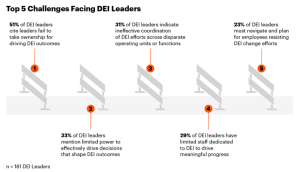At the start of February – to mark the start of Black History Month in fact – TLNT interviewed Jeffrey L Bowman – a former senior partner and MD at ad agency Ogilvy & Mather; now CEO and the founder of diversity consultancy, Reframe.
To put it mildly, he didn’t pull his punches.
DEI initiatives will inherently fail – he asserted – because most DEI professionals don’t have the required ‘change management’ mindset (and therefore skillset) to really embed diversity policies across the organization.
Unsurprisingly, the interview provoked reaction. But could new data suggest he is correct in his viewpoint?
Recently, Gartner polled 181 DEI leaders specifically about their proficiency, effectiveness and experiences leading the DEI function.
The results make compelling reason – not least because they seem to agree with Bowman – with the majority of those questioned (51%) claim their top challenge is leadership failing to take ownership for helping drive DEI outcomes.
As if to reinforce this, it found 33% of DEI leaders said they feel they have “limited power” to effectively drive decisions that shape DEI outcomes.
In other words – don’t blame us, blame the boss!
Failure of leadership to support them, plus lack of dedicated support to make change a reality actually topped Gartner’s list of the five key challenges DEI professionals claim to face (See illustration below).

But here’s a question: is this all just sour grapes on the part of DEI professionals?
Shouldn’t these DEI experts be the ones responsible for making change?
Is blaming inaction on others an attempt to deflect their own failings?
To look more closely at the results of the research, TLNT spoke to report author, Chandra Robinson, a director in the human resources practice within Gartner’s Research & Advisory division:
Q: What was the research looking to uncover?
A: “For the first time, we wanted to take a look at DEI leadership effectiveness, so we surveyed more than 180 DEI leaders from 24 different countries. All respondents had to have been in a leadership position for a minimum of five years, and they had to work in organizations with at least 1,000 employees. The research was done to try and identify what their swimming lanes were; their priorities, and how DEI leaders can set themselves up for success.”
Q: DEI leaders have been criticized for lacking skills to succeed. Did your research concur with this?
A: “At an overview level, the data suggests that everyone in business needs to shift their norms around what company culture is held to be, and why they do the things they do. Concentrating more closely on DEI professionals, there was certainly an observation that DEI professionals need to be more adept at change management. But they also need to have better emotional intelligence, listening skills, and be better at collaboration.”
Q: How important do you see the change management aspect in all this?
A: “Building a sustainable DEI strategy is absolutely about working with the C-suite, and employees, but it’s also about removing pernicious drivers of exclusion and inequality. This is where data collection, and working lock-step with a people analytics perspective is essential – to find potential disparities (such as under-represented segments), that need rooting out. In any change management there is always resistance, and we found that it is planning for this resistance that is also a key DEI leadership skill. Otherwise, we found DEI projects can easily get de-railed. Partnerships are key for eliminating this. A DEI lens needs is needed across the whole organization and it must include the whole employee lifecycle.”
Q: What about the elephant in the room. Your research reveals DEI leaders say they have limited dedicated staff to drive meaningful progress. Is this just an excuse for them not being successful at making change happen themselves?
A: “Failing to take ownership of DEI and then being able to cascade this down through the rest of the business is certainly an accusation leveled at DEI staff. We find 29% of DEI leaders say they don’t have dedicated staff to make change happen. But we advise that DEI leaders move away from collective responsibility to what we call ‘consequential accountability’. We are saying that we require progress to be made – and this means tying DEI aims to actual performance. But we also acknowledge that they also claim to have limited power, and that their function is too lean. But this is why they need to work more on being influencers and using this skill to drive outcomes.”
Q: So who needs to take ownership for this – DEI leaders themselves, or CEOs who can confer permission to foment change?
Q: “I do think DEI professionals need better empowerment by their leaders. If we’re going to tie DEI aims to performance, then DEI professionals need to be given the tools they need to do it. DEI needs to start with the organization – in that the organization needs to decide diversity/equality is a priority. It’s only then that someone (or a team), can drive DEI. When organizations say DEI is a priority, but don’t staff themselves to make change, then a contradiction is happening. But does this let DEI professionals off the hook? No. I think a combined effort is needed too. DEI heads need to demand performance happens too – even though they might have a lean team. Everyone needs to know that DEI professionals need to create their own partnerships across the business, so that real change can be embedded.”
